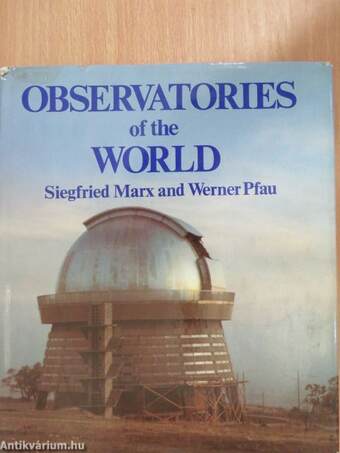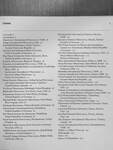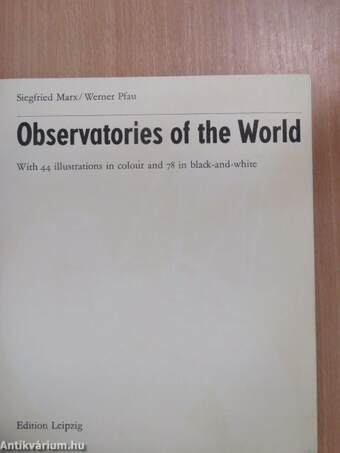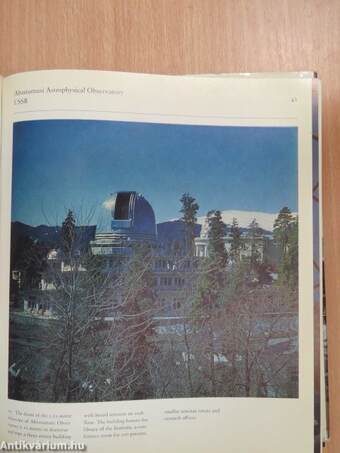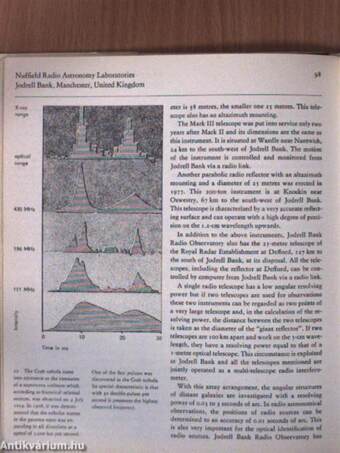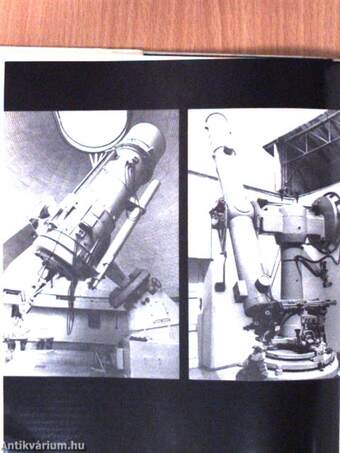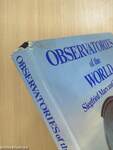1.066.542
kiadvánnyal nyújtjuk Magyarország legnagyobb antikvár könyv-kínálatát

VISSZA
A TETEJÉRE
JAVASLATOKÉszre-
vételek
Observatories of the World
| Kiadó: | Edition Leipzig |
|---|---|
| Kiadás helye: | Lipcse |
| Kiadás éve: | |
| Kötés típusa: | Vászon |
| Oldalszám: | 200 oldal |
| Sorozatcím: | |
| Kötetszám: | |
| Nyelv: | Angol |
| Méret: | 23 cm x 20 cm |
| ISBN: | |
| Megjegyzés: | Fekete-fehér és színes fotókkal, ábrákkal. |
naponta értesítjük a beérkező friss
kiadványokról
naponta értesítjük a beérkező friss
kiadványokról
Fülszöveg
There has been a great upswing of interest
in matters astronomical, with the general
public taking the opportunities offered by
planetariums, public lectures, and literature
to find out more about astronomic subjects,
whose modern developments (giant tele-
scopes, radio telescopes, and space travel)
pave the way to a deeper understanding of
the universe around us. This book deals
with one particular aspect of general
interest, introducing the reader to forty
selected observatories.
The authors:
Dr Siegfried Marx was born in Berlin in
1934. He began his astronomical studies
in Jena, where from 1961 to 1974 he held
various posts in the University Observatory.
Since then he has been in charge of the Karl
Schwarzschild Observatory, Tautenburg.
Dr Werner Pfau was born in Chemnitz
(now Karl-Marx-Stadt) in 1936. His "way to
the stars" has been linked with the University
of Jena, where he studied from 1954 to i960,
after which came appointments in the
University... Tovább
Fülszöveg
There has been a great upswing of interest
in matters astronomical, with the general
public taking the opportunities offered by
planetariums, public lectures, and literature
to find out more about astronomic subjects,
whose modern developments (giant tele-
scopes, radio telescopes, and space travel)
pave the way to a deeper understanding of
the universe around us. This book deals
with one particular aspect of general
interest, introducing the reader to forty
selected observatories.
The authors:
Dr Siegfried Marx was born in Berlin in
1934. He began his astronomical studies
in Jena, where from 1961 to 1974 he held
various posts in the University Observatory.
Since then he has been in charge of the Karl
Schwarzschild Observatory, Tautenburg.
Dr Werner Pfau was born in Chemnitz
(now Karl-Marx-Stadt) in 1936. His "way to
the stars" has been linked with the University
of Jena, where he studied from 1954 to i960,
after which came appointments in the
University Observatory, of which he is now
in charge. Vissza
Témakörök
- Idegennyelv > Idegennyelvű könyvek > Angol > Természettudományok > Csillagászat
- Idegennyelv > Idegennyelvű könyvek > Angol > Természettudományok > Egyéb
- Idegennyelv > Idegennyelvű könyvek > Angol > Művelődéstörténet
- Idegennyelv > Idegennyelvű könyvek > Angol > Helytörténet
- Művelődéstörténet > Intézményei > Egyéb
- Helytörténet > Helyismeret > Intézmények
- Természettudomány > Csillagászat > Egyéb
- Természettudomány > Csillagászat > Idegennyelvű
- Természettudomány > Csillagászat > Űrhajózás, űrkutatás
- Természettudomány > Általános természettudomány > Kutatások, felfedezések
- Természettudomány > Általános természettudomány > Tudomány
- Természettudomány > Általános természettudomány > Idegennyelvű > Angol



